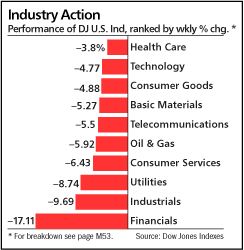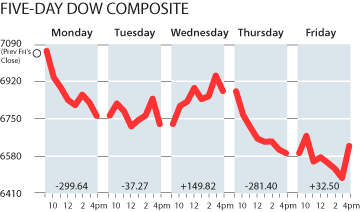Why Ford Can Double
By MICHAEL SANTOLI
Alan Mulally, chief executive of Ford Motor (ticker: F), is executing a high-stakes task of strategically shrinking the company in plain sight of the investment world. Hardly anyone is bothering to take notice, but investors should pay closer attention, because the turnaround he and his largely new team is engineering could result in a double or better in Ford's shares, now near a 25-year low at 6.49.
To the extent that the market likes anything these days, it prefers companies that have strong overseas profit growth, benefit from a weaker dollar and have a clear path to better profit margins, all of which apply to Ford.
But the stock, down from above 9 in mid-2007, has few friends on Wall Street. Only three of 13 analysts recommend the stock (four rate it a Sell), and short interest has risen from 150 million shares to 250 million this year.
All the focus on monthly sales and the recession vigil are diverting investors' sights from the very attractive big picture. Namely, Ford quality is up; it has billions in excess liquidity; a new-model rollout is approaching; the days of making cars just to keep the factories open are gone, and management is selling secondary assets and unifying the global organization.
Consumer Reports rated Ford's portfolio by far the highest quality of the Detroit Three this year, and better than most imports. Warranty expense in 2007 fell $1 billion. Price-per-vehicle rose $1,000, as Ford sent fewer cars into rental fleets. Overall car affordability is high, and the basic replacement cycle will help demand in the near term.
David Markowitz of value-oriented hedge fund SLS Capital, a significant Ford shareholder, estimates that last year's 17-cent loss per share -- far lower than forecasts -- would have been 57 cents in earnings if the forthcoming UAW health-care and wage deals had been in effect. So the base of earnings power upon which the present margin expansion begins is well higher than the Street acknowledges. Without making aggressive assumptions, Markowitz sees Ford earning $1.44 in 2009, more than double the Street's consensus expectation. At recent prices, Ford is trading at about 2.2 times expected 2009 cash flow, less than half its historical cash-flow multiple.
A consumer recession could bite into projected sales and keep the news flow negative. But at prices below 7, it seems that Ford shares are offering that ever-elusive margin of safety that value investors covet.
Subscribe to:
Post Comments (Atom)



No comments:
Post a Comment